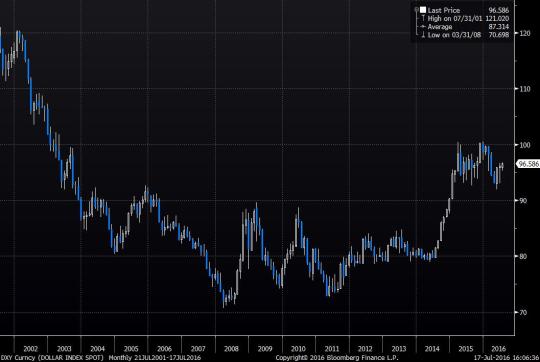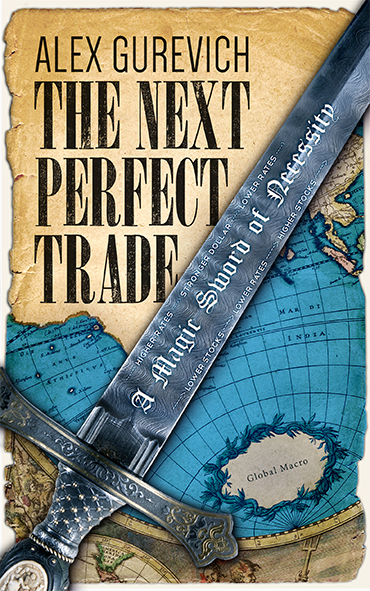A fascinating debate about equity valuations and the validity of lofty bond prices rages on. Some macro thinkers such as @MarkYusko, while not exactly calling top of the stock market, recommend building a substantial cash position. Their strategy is to wait in order to take advantage of an eventual, inevitable bursting of the equity bubble.
I do not intend to contribute an opinion to whether equities are currently a bubble or not; in fact, I have no opinion to contribute. But assuming some reasonable concern over valuations, cash appears aligned with my own recommendations in Chapter 5 of my book. In that chapter I propose sitting out the bubbles rather than trying to aggressively time them. This strategy avoids the risk of blowing up either on the short or on the long side.
However, it is important to understand that line of reasoning is predicated on the assumption that “cash” is actually SAFE.
For an individual cash has two separate, though interwoven aspects: cash is a means to pay for one’s lifestyle and it is a financial asset.
Those financially less secure will require the safety of cash to meet their immediate needs such as rent or food. If they are fortunate to have some savings they may be concerned that cash may fail to keep up with inflationary pressure, but if they live paycheck to paycheck they must count on the wage inflation.
For the purposes of this post, however, I am using the term ‘cash’ from the perspective of a money manager whose central objective is absolute performance. For such a manager, cash is purely a financial asset.
Managers tend to think of cash as “safe”. They lean on the thinking that when benchmarked to cash, cash will never deliver a negative return which is important both psychologically and in terms of calculating incentive fees. But such benchmarking is somewhat arbitrary: for example if you are benchmarked to gold your safest asset is gold and when you are benchmarked to S&P 500 your safest asset is…And so on.
The very concept of a “risky” asset comes from benchmarking.
While the concept of over/underperformance vs. a benchmark is relative to the choice of benchmark, the absolute performance is unambiguous. And by absolute I mean absolute – weighted by the performance of your base currency. That is a Euro-based asset manager who delivered a 10% return in 2014 still underperformed USD cash on that year. Notice that as incentive fees are calculated in base currency, most money manager wouldn’t currency-weigh their performance.
But if you are a truly global money manager you can think of cash as unsafe in three different ways:
- You have base currency risk
- You have benchmark risk, i.e. if you are supposed to track a stock index and you stay in cash – well you know what bad things may happen…
- You may underperform competitors in terms of returns in base currency
In summary, as a global manager, I view cash as an asset as risky as all others. My goal is absolute performance. While long-only managers can only make a decision to hold or not to hold cash, I have the option to be short or long cash like any other asset.
Indeed, using leverage to go long another financial asset is equivalent to going short cash, while going short an asset is equivalent to going leveraged long cash.
Having established our view of cash as a highly speculative investment, let’s look at how it is has performed.
USD cash was a good place to be invested early in 2008. The dollar index bottomed out in March 2008 and surged over the next year to make a cyclical top in March 2009 – the same month the stock market made its bottom. Over that year, dollar cash beat all stock markets, most commodities, most other currencies, most risky bonds. It only underperformed Treasuries – as one might have expected.

A bubble had formed. Yes the greatest bubble of this millennium (so far) was not Internet-2000, Sunprime-2006 or Bitcoin-2014.
It was Cash-2009.
Panicked, trading chickens who had piled into this cash bubble were brutally punished as recovering asset prices left them behind. How do I know that? Well, somebody had to be my counterparty.
Much of my success in subsequent years was due to recognizing this bubble and following my advice to sit it out. No, I didn’t go short cash. I just rotated my money out of it into the “safe haven” of stocks.
After an initial rebound, I got an additional tailwind as the Fed started to pound on cash by the wave of supply provided by multiple QEs.
Between 2010 and 2014 I gradually realized that the other CB’s will have to follow suit and destroy the value of their own cash. Now it was time to short foreign cash. The One Trade was born.
My version of it was not to be just long Treasuries, but to build leverage funding them in low (and now negative) yielding DM currencies.
The continuing success of that trade has been nothing short of magical.
But, now the question is whether the trade has gone too far and the cash has actually become too cheap? The question more ambiguous as to whether I mean dollar or RoW cash. Much of the recent underperformance of USD-based mangers can be explained by the fact that they are benchmarked to strongly performing asset: USD.
Thus far my answer was to be slightly less net short cash, i.e. book some profits but still run the core position. Why am I being so stubborn, despite the lofty asset valuations?
When I think of cash as an asset (or even as a commodity?) there is practically no limit to how cheap you can get it by producing more and more of it. And that is what the BoJs and the ECBs of the world have been doing without any sign of stopping so far.
So is their no risk to being long bonds vs. cash? Theoretically there is. Going back to the duality of cash we have discussed earlier, cash can cheapen in two different ways:
- Against real goods and services
- Against financial assets
So far we are only seeing the latter in DM. The former is called inflation and when it arrives some financial assets may do even worse than cash. Paradoxically, in the event of an inflation scare, cash is historically the place to be as the DM CBs tend to protect it by raising rates and keeping its total return positive. Negative real interest rates are typically a product of a deflationary environment.
My central thesis is that secular automatization and globalization still channel excess cash into the asset rather than goods prices. But cyclical inflationary forces are not to be disregarded out of hand.
The case for cash is not proven, but it needs to be heard.


